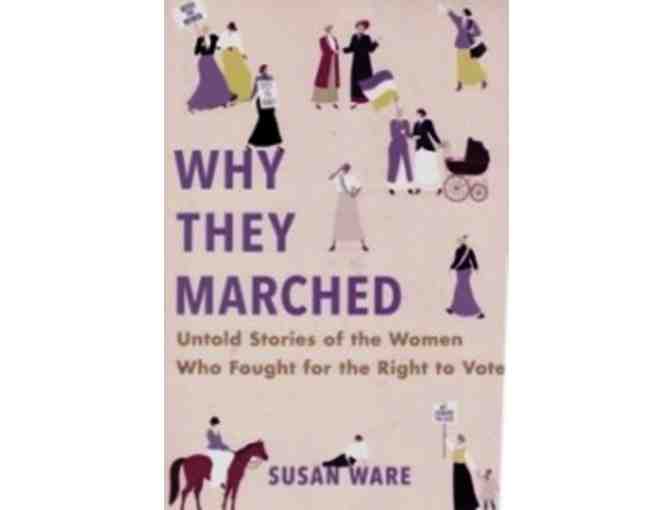Books
Why They Marched Untold Stories of the Women Who For the Vote by Susan Ware
- Item Number
- 285
- Number of Bids
- 5 - Bid History
Item Description
Why They Marched: The Untold Stories of the Women Who Fought for the Right to Vote by noted historian and biographer Susan Ware
This is a great read for this year, as the 100th anniversary of U.S. women’s suffrage comes up this August. I
Ware does not treat the American suffrage movement as a monolithic, unified group of women, as many less complicated representations have done in the past. Instead, she uses the extended metaphor of a museum to look at artifacts from the suffrage movement and connects them to the stories of individual women, including women of color, working-class women, and women who were actually against women’s suffrage.
I especially enjoyed the chapters on Charlotte Perkins Gilman and emerging definitions of feminism; Maud Nathan and Annie Nathan Meyer, two sisters on opposite sides of the debate; and Claiborne Catlin Elliman, who rode her horse 530 miles on a pilgrimage campaigning for suffrage. Claiborne Catlin’s story was especially fascinating to me (and sad; she lost her poor horse). The journey was exhausting for her and in August she wrote in her diary “I’m so tired I wish I had never been born” (Ware 134). Same, girl.
Ware does a nice job of exploring the nuanced way that suffrage intersected with other issues in women’s lives. For example, in a fascinating chapter, she looks at the role of Mormon women, who had the right to vote in Utah, and their conflicted relationship with the movement, which disapproved of polygamy. The book is perhaps at its best when it examines the intersectional feminism of black suffragists who had to fight for their role within the suffrage movement, which was all too happy to exclude them if they had to get the vote. The chapter about Ida B. Wells and the 1913 suffrage march in Washington, D.C. Wells, and other black women were asked to march not with the groups from their states, but in their own group a the back, in order to appease the racist suffragists from the south (eye-roll). Naturally, Wells thought this request was absurd. She said, “it only required that our women should be as firm in standing up for their principles as the Southern women are for their prejudices” (Ware 103). When it came down to it, Wells seemed to acquiesce, but then she came in from the sidelines to march with the other women from Illinois. Southern women could just deal with it.
This book is not necessarily a quick read. It is pretty dense with information, but the chapters are easily digested, so it makes a good volume to pick up and put down as you have time to read and learn. I recommend picking up a copy and going through the stories of these remarkable women before this August 26th.
Hardcover 336 pages
Item Special Note
The shipping cost is determined by the weight of the item and the distance of delivery.
All winning bids are shipped together. Please allow two weeks for delivery.
Thank you for your support,
The National Women’s History Alliance
National Women's History Project stores data...
Your support matters, so National Women's History Project would like to use your information to keep in touch about things that may matter to you. If you choose to hear from National Women's History Project, we may contact you in the future about our ongoing efforts.
Your privacy is important to us, so National Women's History Project will keep your personal data secure and National Women's History Project will not use it for marketing communications which you have not agreed to receive. At any time, you may withdraw consent by emailing Privacy@frontstream.com or by contacting our Privacy Officer. Please see our Privacy Policy found here PrivacyPolicy.

